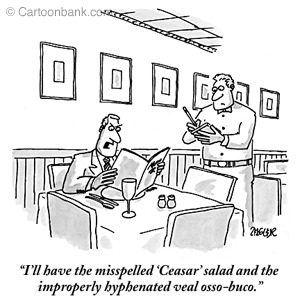Without copy editors, too many sentences in too many books wuodl look liek htis.
 Copy editors occupy a narrow and sadly unheralded niche in both book and newspaper publishing hierarchies. At the top is an editor—the big picture person, who first reads a manuscript or story and (please God) points out the gaping holes, the unsupported leaps in logic, and the boring stuff that should have succumbed to the machete. I’m very lucky to work with Judy Sternlight Literary Services. Judy ever so gently nudges my manuscripts not just to the next level, but a few levels beyond.
Copy editors occupy a narrow and sadly unheralded niche in both book and newspaper publishing hierarchies. At the top is an editor—the big picture person, who first reads a manuscript or story and (please God) points out the gaping holes, the unsupported leaps in logic, and the boring stuff that should have succumbed to the machete. I’m very lucky to work with Judy Sternlight Literary Services. Judy ever so gently nudges my manuscripts not just to the next level, but a few levels beyond.
The proofreader is at the other end of the process, the final set of eyes, focusing strictly on spelling and grammatical errors.
Somewhere in between lies the copy editor. A proofreader, yes, but oh so much more. The dictionary, ho-hum, calls a copy editor “the person who edits a manuscript for publication.” In plainer language (something a copy editor might have suggested), the dictionary could have said, “A copy editor Saves Your Sorry Ass.”
Full disclosure: I spent a significant portion of my newspaper career as a copy editor. I liked editing the stories, but never managed to master the art of headlines. I’ve also worked as an editor, when copy editors Saved My Sorry Ass by catching things I missed, and as a reporter, where, well, ditto. Because of my time on various copy desks, I know the difference between gantlet/gauntlet, effect/affect and that yes, “accommodation” really does have all those letters in it. These days newspaper companies are cutting copy editing jobs like crazy, reasoning (although reason appears to have little to do with it) that reporters and editors can catch their own mistakes. Even though most reporters and writers know from hard experience that a second—or third, or fourth—set of eyes will always, always find things they missed. Boo to newspapers for doing this.
Now I’m dealing with copy editors in the book world. Barbara Anderson is the copy editor for The Permanent Press, and when she gets tired of combing through manuscripts, she should become a homicide detective. The cold case files would vanish overnight. This woman leaves nothing unturned. I both dread/anticipate her long, single-spaced lists of every single issue—from proper capitalization (High Plains, who knew?) to logistical glitches—she finds in my manuscripts.
Dread, because sometimes the only answer I have to an item that basically asks, “What were you thinking here?” is, “Damned if I know.” Anticipation, because by the time we’re finished, the book is a lot better.
So hurray for copy editors. Maybe that dictionary definition should simply read Kings and Queens of the Universe.


Leave a Reply